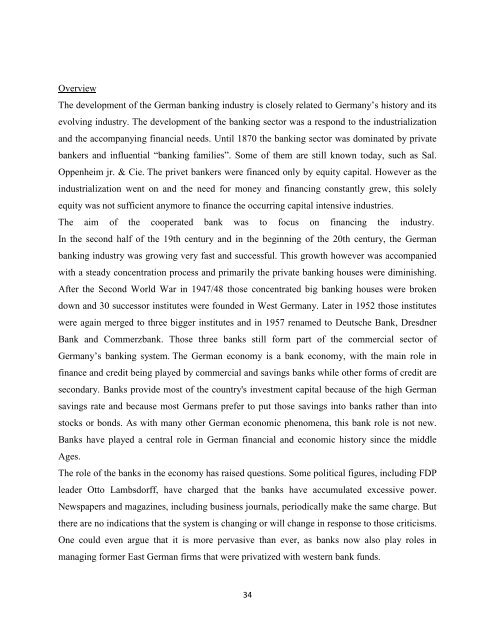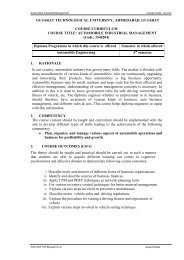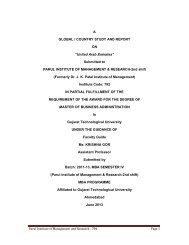751-Sabar Institute Of Management, Tajpur - Gujarat Technological ...
751-Sabar Institute Of Management, Tajpur - Gujarat Technological ...
751-Sabar Institute Of Management, Tajpur - Gujarat Technological ...
Create successful ePaper yourself
Turn your PDF publications into a flip-book with our unique Google optimized e-Paper software.
Overview<br />
The development of the German banking industry is closely related to Germany’s history and its<br />
evolving industry. The development of the banking sector was a respond to the industrialization<br />
and the accompanying financial needs. Until 1870 the banking sector was dominated by private<br />
bankers and influential “banking families”. Some of them are still known today, such as Sal.<br />
Oppenheim jr. & Cie. The privet bankers were financed only by equity capital. However as the<br />
industrialization went on and the need for money and financing constantly grew, this solely<br />
equity was not sufficient anymore to finance the occurring capital intensive industries.<br />
The aim of the cooperated bank was to focus on financing the industry.<br />
In the second half of the 19th century and in the beginning of the 20th century, the German<br />
banking industry was growing very fast and successful. This growth however was accompanied<br />
with a steady concentration process and primarily the private banking houses were diminishing.<br />
After the Second World War in 1947/48 those concentrated big banking houses were broken<br />
down and 30 successor institutes were founded in West Germany. Later in 1952 those institutes<br />
were again merged to three bigger institutes and in 1957 renamed to Deutsche Bank, Dresdner<br />
Bank and Commerzbank. Those three banks still form part of the commercial sector of<br />
Germany’s banking system. The German economy is a bank economy, with the main role in<br />
finance and credit being played by commercial and savings banks while other forms of credit are<br />
secondary. Banks provide most of the country's investment capital because of the high German<br />
savings rate and because most Germans prefer to put those savings into banks rather than into<br />
stocks or bonds. As with many other German economic phenomena, this bank role is not new.<br />
Banks have played a central role in German financial and economic history since the middle<br />
Ages.<br />
The role of the banks in the economy has raised questions. Some political figures, including FDP<br />
leader Otto Lambsdorff, have charged that the banks have accumulated excessive power.<br />
Newspapers and magazines, including business journals, periodically make the same charge. But<br />
there are no indications that the system is changing or will change in response to those criticisms.<br />
One could even argue that it is more pervasive than ever, as banks now also play roles in<br />
managing former East German firms that were privatized with western bank funds.<br />
34
















